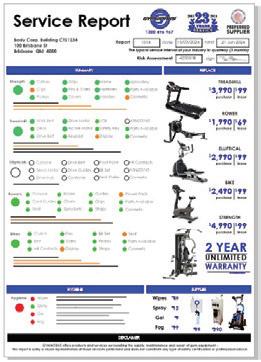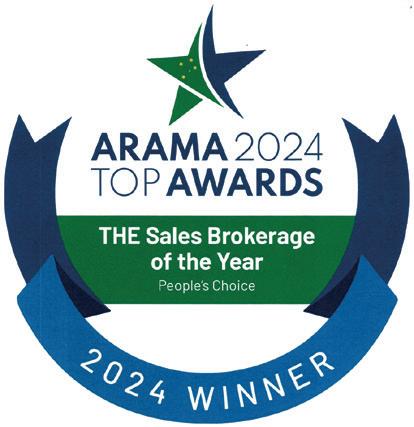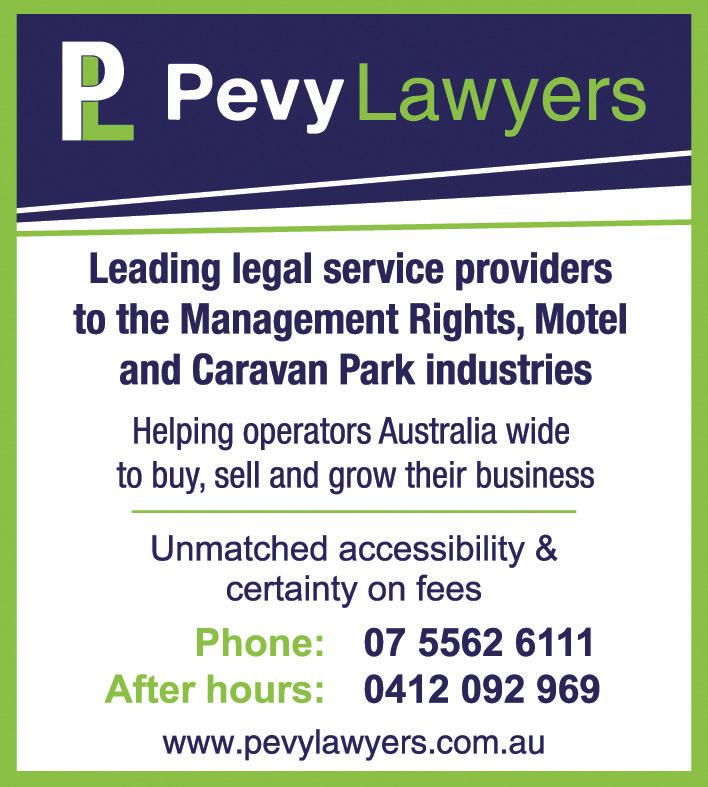































































































The views and images expressed in Resort News do not necessarily refl ect the views of the publisher. The information contained in Resort News is intended to act as a guide only, the publisher, authors and editors expressly disclaim all liability for the results of action taken or not taken on the basis of information contained herein. We recommend professional advice is sought before making important business decisions.
The publisher reserves the right to refuse to publish or to republish without any explanation for such action. The publisher, it’s employees and agents will endeavour to place and reproduce advertisements as requested but takes no responsibility for omission, delay, error in transmission, production defi ciency, alteration of misplacement. The advertiser must notify the publisher of any errors as soon as they appear, otherwise the publisher accepts no responsibility for republishing such advertisements. If advertising copy does not arrive by the copy deadline the publisher reserves the right to repeat existing material.
Any mention of a product, service or supplier in editorial is not indicative of any endorsement by the author, editor or publisher. Although the publisher, editor and authors do all they can to ensure accuracy in all editorial content, readers are advised to fact check for themselves, any opinion or statement made by a reporter, editor, columnist, contributor, interviewee, supplier or any other entity involved before making judgements or decisions based on the materials contained herein.
Resort News, its publisher, editor and sta , is not responsible for and does not accept liability for any damages, defamation or other consequences (including but not limited to revenue and/ or profi t loss) claimed to have occurred as the result of anything contained within this publication, to the extent permi ed by law.






Advertisers and Advertising Agents warrant to the publisher that any advertising material placed is in no way an infringement of any copyright or other right and does not breach confi dence, is not defamatory, libellous or unlawful, does not slander title, does not contain anything obscene or indecent and does not infringe the Consumer Guarantees Act or other laws, regulations or statutes. Moreover, advertisers or advertising agents agree to indemnify the publisher and its’ agents against any claims, demands, proceedings, damages, costs including legal costs or other costs or expenses properly incurred, penalties, judgements, occasioned to the publisher in consequence of any breach of the above warranties. It is an infringement of copyright to reproduce in any way all or part of this publication without the wri en consent of the publisher.
2025 Multimedia Pty Ltd
As we bounce into a brandnew year, there’s a mix of cautious optimism and genuine excitement — but this year feels especially meaningful. In 2025, Resort News proudly celebrates 30 years as a print publication.
For three decades, we’ve stood side by side with the management and letting rights industry, delivering insightful content and unwavering support. Even through challenges like the COVID-19 pandemic, the rise of digital media, and escalating print and postage costs, we’ve remained steadfast in our commitment to providing a trusted, tangible resource each month. It’s a legacy we’re deeply proud of.
Recent research highlights the enduring appeal of print




Mandy Clarke, Editor editor@accomnews.com.au
magazines, with 11.7 million Australians continuing to read them — a 3.6 percent increase from the previous year.
Business-focused magazines like Resort News remain essential, proving the value of connection and depth in a world increasingly driven by instant news gratification.



Adding to this success, our sister publication, AccomNews, was recognised last year by FeedSpot as the 15th-best magazine in Australia — an incredible honour out of 6671 contenders. This recognition reflects the growing influence of AccomNews in the digital publishing landscape.
These achievements highlight the importance of knowing your worth — a theme Trevor Rawnsley explores in his column this month. Trevor emphasises that from property management expertise to local market knowledge, your value proposition truly sets you apart. Just as Resort News has stayed true to its mission for 30 years, this message is a powerful reminder to stop underselling yourself and start celebrating the work you do.
We also continue our tradition of shining a spotlight on inspiring individuals. This month, we interview Craig Moore, the
2024 Manager of the Year at the Best of Tourism Awards. Craig’s dedication is evident in his work managing Air on Broadbeach for ULTIQA Hotels.
Another standout is Lynda Woodgate, who has been managing Island Beach Resort on the Gold Coast with her children, Chris and Jessica Filer. Transitioning from teaching in South Auckland, Lynda’s journey showcases resilience, adaptability, and the strength of building meaningful relationships.
Looking forward, take a moment to reflect on your own achievements and set your sights on your goals for 2025.
From all of us at Resort News, thank you for being part of our journey. Here’s to a prosperous, joyful, and successful year ahead.
Warm regards, Mandy












By Trevor Rawnsley, CEO, ARAMA
Charging what you’re really worth is the foundation of any successful business, and it’s vital in the Management and Letting Rights (MLR) industry.
Maximising your profit comes down to your ability to demonstrate value rather than price. So, what is your value proposition?
MLR offers unparalleled value by combining professional property management with a deep understanding of local markets to deliver consistent financial returns and peace of mind for your clients (lot owner-occupiers or lot ownerinvestors). Your business acts as a long-term partner, ensuring the scheme and investors’ lots are well-maintained, compliant with regulations, and achieve high occupancy rates. By handling day-to-day operations, tenant and guest relations, and maintenance, your business enables your clients to enjoy hassle-free living and investing in strata.
Your MLR business delivers benefits that extend far beyond financial returns. Successful operators enhance the lived experience for people who rent, live, or invest in community title schemes.
Sadly, we have found that many residential managers are seriously underselling themselves and not realising the value they deliver to their clients and customers.
ARAMA’s most recent biannual cost and charges survey, analysed by leading MLR accountants Tony Rossiter and Robert Cuda, revealed that while ARAMA members across the country are charging a fair rate — an average of $54 an hour plus GST for their services — managers in the north, for example, are charging just $37 an hour plus GST. That $17-an-hour difference adds up to thousands of dollars a year, meaning managers are effectively robbing themselves and their businesses of deserved income.
The subject of fees and charges in strata is controversial now, with one of Australia’s most high-profile strata management firms accused of overcharging and receiving kickbacks from contractors and suppliers.
ARAMA members, who operate as caretaking service providers to a body corporate or owners corporation, work under a contractor service agreement and a code of conduct that
includes full disclosure of their fees and charges agreed to in advance by their clients and/or the body corporate or owners corporation.
There is full transparency. Residential managers must demonstrate good value for money. They should also demonstrate good sense by not depriving themselves of a fair return for a fair day’s work on behalf of their clients and/or the body corporate or owners corporation.
Yet, Tony Rossiter from Holmans Accounting says the trend for some residential managers to undercharge for their work is something “we have observed over many years.”
Tony said: “One theory is that some residential managers do not appreciate the value they deliver to a scheme and generally are less likely to rock the boat, so to speak, by increasing their charges. Perhaps they fear upsetting their clients and losing them from their letting pool if they increase their fees.
“Another reason could be that some regional markets are somewhat isolated from the main MLR market, which is South East Queensland. By being isolated, those residential managers may have missed the train to regularly increase their own charges, yet are watching the price of other services such as linen, cleaning, and labour increase over the last couple of years.
“In ARAMA’s most recent cost and charges survey, cleaning, linen, and labour charges had increased substantially since the last survey two years ago.”
Cairns-based accountant Robert Cuda, from Caatz Management Rights Accountants, said, “Some residential managers haven’t appreciated the value of their own time in getting repairs and maintenance done for owners. We have been encouraging clients to review their fees and charges immediately and to increase their fees and charges in line with what is fair and what is being charged in the rest of the country.”
The reluctance of many residential managers to charge for their true value comes despite significant increases in charges for other aspects of the business.
Cleaners on weekends are charging more than $50 an hour at many properties, and during COVID some were getting $70 an hour cash in hand. Those cleaners recognised the value they delivered to the business.
It’s the same in many other areas.
It’s time that all residential managers realise their true value and the positive impact their work has on others.
ARAMA members who are residential managers have a vested interest in ensuring schemes are managed effectively and efficiently.
But how much should you charge for services outside your agreements? ARAMA fields many enquiries from members on this subject.
The cost and charges survey is freely available to members on the ARAMA website and is just one of a range of tools ARAMA provides to answer the questions and problems


residential managers face regularly. The survey provides valuable comparative data for residential managers and other ARAMA members and covers the major costs and charges that generate business profitability.
There is an accompanying webinar on our website that goes into the specifics of these charges as well as the correct process to implement any increases. If members need additional help beyond this, ARAMA can recommend a specialist accounting firm to assist.
But there is a lot of extra work a residential manager performs for unit owners not covered by the letting agreement, such as organising tradesmen and renovations for clients who live interstate or overseas.
A common practice within our industry is that for any work we arrange for a lot owner, a 10 percent fee is charged for our time on top of what the tradesperson charges.
This is not work for the body corporate because that is usually covered by the caretaking remuneration contract. It is separate work for a lot owner client who may not live nearby and needs the residential manager to do work on their behalf.
A residential manager might have to organise a plumber, electrician, or builder to undertake work inside a unit. That manager then must meet the tradesperson, ensure the unit is vacant, deal with the guest or tenant who might have been there, complete paperwork, receive the invoice, and pay the invoice.
There has to be some compensation for that extra work.
As long as the residential manager discloses that fee and can produce the original
invoice if an owner wants to see it, then that’s quite fair and appropriate. There can often be a lot of work involved in organising and paying tradies, and it saves an owner from having to travel to arrange it themselves. It’s usually a very small fee compared with the costs an owner would incur for having to arrange the work themselves.
By doing that work on behalf of the lot owner client, the residential manager is saving that owner a considerable amount of time and money. It’s only fair that the manager charges an appropriate fee for that value-added service.
Business coach Mel Kettle, who publishes the Connected Leadership newsletter, recently gave some great advice on how to charge what you’re worth.
She says she puts a price on value rather than time, considering things such as expertise and experience.
Mel says charging a low price can signal low quality or inexperience and that by clearly communicating your value, you give clients “a way to understand what makes you unique beyond costs. This positions you as a credible choice, rather than just an option that fits within their budget”.
She says when you can explain your skills, expertise, and the outcomes you can help clients achieve, you build trust and confidence. Clients want to work with people they believe can deliver results, solve their problems, and provide peace of mind. Being able to clearly communicate these factors gives
them a reason to trust in your abilities, and the best residential managers are those with a great reputation for professionalism among their clients.
The ARAMA Community Connect Toolkit is another great resource available exclusively to ARAMA members to help them communicate value.
Mel rightly points out that value-driven communication
is about cultivating longterm partnerships and repeat business. When clients see you as an integral part of their team or community, they’re more likely to stay with you, refer you to others, and consult you on future needs, regardless of price. That’s certainly the case in the MLR space when it comes to keeping units in the letting pool and asking for top-ups on agreements.
The cost and charges survey is a great place to decide what is a fair price for your work.
Maximising your profit really comes down to your ability to demonstrate value rather than price. So, what is your value proposition?












By Ben Ashworth, Senior Associate, Small Myers Hughes Lawyers
Fortunately, for the vast majority of people reading this, the story I’m about to tell is one you were completely oblivious to. For building managers in NSW in particular, ignorance is bliss, and you were actually able to get some sleep for the last few months.
In September 2024, the Australian Resident Accommodation Managers Association (ARAMA) was contacted by NSW Fair Trading with an invitation to provide feedback on a confidential draft strata legislation reform bill that was about to go to the NSW parliament. ARAMA was given just a couple of weeks to consider the significant changes being proposed. Changes it turns out, that would have killed the management rights industry in NSW and have negative repercussions Australia-wide.
Knowing that any change in the strata laws would have an impact on management rights,
Where were you on the day management rights died in NSW?
Trevor Rawnsley and the ARAMA team organised an urgent meeting to discuss the proposed changes. Myself, along with a number of other lawyers and building managers representing a significant cross-section of the entire management rights industry in NSW attended that meeting. Had ARAMA not organised this meeting, none of us would have been aware of what was about to happen.
All building manager agreements would be dropped to a threeyear maximum term.
Existing building manager agreements and service contracts that were over three years in length could be considered “unfair”, and terminated under new unfair contracts legislation.
Owners corporations would be able to deny the appointment of a building manager who didn’t have prior experience as a building manager.
Building managers would be banned from seeking other income sources from owners.
Building managers would effectively be required to share trade secrets with owners corporations concerning the calculation of their fees and commissions.
Building managers would be required to perform certain caretaking duties relating to fire safety and the preparation of maintenance and repair proposals, regardless of whether they were paid to perform these duties or if the duties were already performed by another person.
All service contracts for an owners corporation (for example plumbers, electricians and elevator maintenance) would require a general meeting to be approved.
To say that we were all shocked and surprised when we realised the extent and impact that these changes would have on the management rights industry (not just in NSW) is an understatement. Realising that we had only days in which to do something about it was daunting.
It was at this crucial moment that I found myself standing in the breach with the task of writing a document on behalf of ARAMA that would, at the last minute, convince the NSW Government not to go ahead with implementing the new laws they had been working on for years.
In less than a week and over 5500 words later, with crucial support from ARAMA’s Trevor Rawnsley, Jeff Beere, Minor Hotels, Accor, Small Myers Hughes, Flood Legal, Mahoneys
and Pevy Lawyers, a written submission was made to NSW Fair Trading. In it, I very politely suggested that the government should take a different approach with their new laws and instead improve the management rights industry in NSW. This message was again repeated in some hastily arranged Zoom meetings between Fair Trading and ARAMA members, as we all made it very clear that the new laws being proposed would result in the cataclysmic destruction of the management rights industry in NSW.
As a result of our efforts, we were heard and the bill was amended. And not just with some small, minor alterations, but with broad unambiguous changes that removed every red flag that we had identified. The management rights industry in NSW has been saved and I can proudly say I was there, on that day. But, in a different timeline where there is no ARAMA representing our industry and bringing these issues to our attention, things would have been so different. Instead of writing this article, I would have been writing an article about where were you on the day management rights died in NSW. I’m glad we don’t live in that timeline!
If you believe that long term agreements are worth fighting for then you should join ARAMA as a member and stay connected to them when asked to renew.
Liability limited by a scheme approved under Professional Standards Legislation.
Disclaimer – This article is provided for information purposes only and should not be regarded as legal advice

contracts are binding for up to 25 years. For schemes registered under the Body Corporate and Community Management (Standard Module) Regulation 2020 (the Standard Module) the time frame is up to 10 years.
Management rights are a common feature of accommodation style and residential community titles schemes. They are a contractual arrangement between the body corporate and a contractor that allows the contractor to provide onsite letting services for owners in the scheme.
Management rights are typically sold by the developer during the original owner control period. Under the Body Corporate and Community Management (Accommodation Module) Regulation 2020 (the Accommodation Module), the
These contracts usually contain options for extension or renewal and can be re-sold by an existing management rights holder.
Management rights have been a source of significant discussion amongst community titles sector stakeholders, as all owners are impacted by the terms of the contract.
This article delves into some of the more contentious issues encountered in relation to management rights arrangements, namely:
• the impact of changing a regulation module on caretaking agreements;
• the current legislative position on extending caretaking agreements; and
• the possibility of review rights for newer schemes.
It is important to note that the information in this article applies to schemes registered under:
• the Accommodation Module, which applies to approximately 10 percent of Queensland community titles schemes; and
• the Standard Module, which applies to approximately 56 percent of community titles schemes.
It does not apply to schemes registered under the Small Schemes or Specified TwoLot Schemes modules.
In addition to the overarching Body Corporate and Community Management Act 1997 (BCCM Act), each community titles scheme is registered under one of five regulation modules. The regulation modules set out more detailed laws that a body corporate must follow. The relevant module is listed in the scheme’s community
management statement (CMS).
A body corporate can vote to change its regulation module at any time, provided:
• the body corporate votes by special resolution at a general meeting to change its CMS (section 62, the BCCM Act);
• the scheme meets the criteria set out in the relevant module – for example, changing to the Accommodation Module requires the lots to be mostly accommodation lots (lots that are predominantly let, available to be let, or part of a hotel), whereas the Standard Module has no criteria to be met.
• for schemes under the Standard or Accommodation Module:
• no votes are cast by proxy at the general meeting; and
• such a motion is not considered more than once in the body corporate’s financial year.
An explanatory note in the approved form – specifically, a BCCM Form 19 outlining the implications of changing a regulation module – must accompany the voting paper for a general meeting where a regulation module change is proposed. The mandatory inclusion of the BCCM Form 19 ensures owners have access to the information necessary to make an informed decision.
There is a common misconception that changing the regulation module is a loophole bodies corporate can use to reduce the length of a caretaking agreement, as various matters about engagements (including the maximum term) are set out in each module.
This is not the case.
Protection is afforded to caretakers under section 128 of the BCCM Act, which confirms that the provisions of the existing regulation module
applying to the engagement or authorisation continue to apply until the engagement or authorisation ends. This means a body corporate cannot strategically use a change of regulation module to reduce an existing caretaking agreement.
For instance, if an Accommodation Module scheme has the maximum 25-year caretaking service contract in place, the body corporate cannot reduce the term of the agreement by changing to the Standard Module (maximum 10 years).
The Accommodation Module provisions continue to apply to the agreement after the change.
The body corporate will only be required to observe the 10-year limit under the Standard Module if they enter a new agreement.
As discussed above, section 128 of the BCCM Act preserves the terms of an existing agreement


even if there is a change of regulation module. However, there may be unanticipated consequences for the future value of the management rights should the regulation module be changed.
For example, management rights may decrease in value if a scheme changes from an Accommodation Module to the Standard Module, as the 10-year maximum term would apply for new engagements. Therefore, the caretaker may incur a monetary loss if they sell the management rights.
Also, reducing the term from a 25-year limit to a 10-year limit may give prospective buyers the impression that the scheme is not “caretaker-friendly”. However, a body corporate may simply be exercising reasonable caution for any future agreements.
While we acknowledge these concerns, it is important to recognise that a change of regulation module may equally serve to benefit a caretaker. For instance, if a caretaker is successful in a proposal to change from the Standard Module to the Accommodation Module, the value of their management rights may increase.
The applicant (an owner and the caretaking service contractor for the scheme) sought a declaration that a motion passed at an extraordinary general meeting (EGM), to change to the Standard Module, was void.
The applicant also sought an order that the body corporate record a new CMS and revert to the Accommodation Module.
The applicant firstly contended that the will of the owners was not properly ascertained due to the body corporate’s failure to include the approved form (BCCM Form 19) with the EGM notice.
The adjudicator acknowledged that the applicant was “correct in stating that the legislature specifically considered that a change of regulation module requires exceptional disclosure to members of the body corporate, explaining the effect of the proposed change”.
However, the adjudicator noted that the body corporate had taken steps to rectify this initial oversight. A subsequent EGM was held where the BCCM Form 19 was sent out with the voting papers and the body corporate resolved, by special resolution, to ratify the preparation and registration of a new CMS.
The applicant further argued that the resolution which passed at the subsequent EGM involved a fraud on the power – where “power is duly executed ... but there is some bargain, or some ill motive, which renders the execution fraudulent”. It was submitted that the regulation module was changed to prevent the body corporate from entering any agreement over 10 years and to “significantly diminish the saleable value of the applicant’s management rights”.
The adjudicator determined that there was no evidence that the body corporate’s decision was “motivated by a desire for personal gain at the expense of a minority or that its actions were dishonest”.
The adjudicator observed that the decision to change the regulation module was made at a general meeting by owners who had received sufficient information to make an informed decision.
Therefore, the application was dismissed.
Bodies corporate, caretakers and prospective purchasers of management rights should note that, despite any change of regulation module, an existing caretaking agreement containing options of extension or renewal can continue indefinitely. Alternatively, where the body corporate consistently votes against any further extensions, the agreement can wind down to zero years.
This question about continuous extensions – or “top ups” as they are known colloquially in the body corporate industry –has been clarified for the first time in a recent decision by a BCCM office adjudicator.
The adjudicator’s decision in Atlantis West confirms the longstanding practice
of topping up caretaking agreements multiple times.
The applicant owner submitted – in relation to sections 140(2) and 141(2) of the Standard Module regarding the term limit of service contracts and letting authorisations – that caretaking agreements can only be topped up (extended) once, not indefinitely.
Therefore, the applicant sought a declaration that the resolution passed at the annual general meeting to extend the existing caretaking agreement for a further period of 1 year and 10 months was void, as the variation would contravene the term limit provisions in the Standard Module.
The adjudicator ultimately dismissed the application and determined that the proper interpretation of section 140(2) of the Standard Module allows for a caretaking agreement to be topped up any number of times, provided that:
• the body corporate resolves to approve the extension by ordinary resolution at a general meeting;
• each extension is for no more than five years; and
• the remaining term never exceeds the 10-year maximum term under the Standard Module.
In reaching this conclusion, the adjudicator considered relevant explanatory notes and the wording of the Standard Module sections in dispute.
The adjudicator also referred to section 86(7) of the Standard Module, which stipulates that a motion proposing to amend an engagement or authorisation to give a right or option of extension or renewal to a service contractor or letting agent cannot be considered more than once in a body corporate’s financial year. Importantly, the adjudicator observed that “it is difficult to reconcile the presence of section 86(7) with the applicant’s argument that the power granted by section 140(2) ... can only be used once”.
In specified circumstances, the BCCM Act enables newly established bodies corporate to request a review of a service contract that was arranged by the developer (original owner). Service contractors also have an opportunity to seek a review under these provisions.
The scope of the review is limited to the fairness and reasonableness of the terms of the agreement, regarding the functions, powers, or remuneration of the service contractor.
Such a review must be conducted by an ‘appropriate person’. The BCCM Act refers to an ‘appropriate person’ who, in the ordinary course of their business, has knowledge of the functions and powers of service contractors and the remuneration for performing those functions and powers.
More information about when a service contract is eligible for review and the details of the review process can be found in sections 130 to 135 of the BCCM Act.
Although these review rights do not extend to the length of the contract, these provisions give bodies corporate and caretakers the ability to ensure contractual terms are fair and reasonable for the life of the agreement.
While the BCCM Act and its associated regulation modules endeavour to strike an appropriate balance between the rights of bodies corporate, developers and those holding management rights, conflict is bound to arise in certain situations.
As well as educating our readers about these critical issues, we hope that this article serves as a reminder about the value of maintaining a harmonious working relationship to avoid unnecessary disputes wherever possible.
If you would like to learn more about caretaking service contractors, read our articles about disputes with caretakers and their role in Common Ground issue 38 and disclosures and commissions in Common Ground issue 46































By Grantlee Kieza OAM, Industry Reporter
Craig Moore is a relative newcomer to the management rights industry, yet he has already been recognised as Manager of the Year at the recent Best of Tourism Awards.
The Resly industry awards, based on peer nominations, are a testament to the remarkable achievements of winners like Craig, whose contributions are highly regarded by others in the industry.
Craig manages the stunning Air on Broadbeach for the ULTIQA Hotels and Resorts Group on the Gold Coast and has also made a notable impact in Noosa, where his involvement with surf lifesaving has even extended to saving lives.
You're a relative newcomer to the accommodation industry?
That’s correct. I’ve been the manager at ULTIQA Air on Broadbeach for two and a half years. While I had some hospitality and hotel experience earlier in my career, the level of responsibility in this role is significantly greater.
How did your new role come about?
It was through an unexpected opportunity. I met Mark Henry, CEO of the ULTIQA Hotels and Resorts Group, who needed to fill a general manager position at short notice. After consulting with our Executive General Manager, Sue Fairweather, he offered me the role. At the time, I had been working in financial services for 17 years, so transitioning to this industry was a significant shift — but one I have found highly rewarding.
Had you considered entering the management rights industry before?
Yes, it was something I had
explored about five years before joining ULTIQA. I previously held a senior role in business and private banking at the Commonwealth Bank, and after leaving in 2017, I considered purchasing management rights. However, another financial services role presented itself, and I delayed those plans. When I joined the ULTIQA Group in May 2022, it felt like the right time, and I’ve thoroughly enjoyed the journey so far. ULTIQA manages seven properties in Australia and one in Fiji, and its parent company, Beekman Group, owns and manages approximately 50 properties in South Africa.
Could you tell us more about Air on Broadbeach?
Certainly. ULTIQA Air on Broadbeach is a mixed-use building that includes owneroccupiers, holiday apartments, and some permanent rentals. My responsibilities encompass managing the resort, building operations and overseeing all staff, including housekeeping, maintenance, and front desk.
The property, built in 2006, has been managed by ULTIQA since 2010. It enjoys an excellent location directly opposite Kurrawa Surf Club and on top of the Oasis Shopping Centre, making it a popular destination for interstate visitors, particularly from Sydney and Melbourne.
To win the Resly Best of Tourism, Manager of the Year Award so early in your accommodation career is an impressive achievement. How did you accomplish this?
I’ve been fortunate to work with a supportive team, particularly under the guidance of Sue Fairweather, whose industry expertise has been invaluable. My previous experience in business and private banking equipped me with skills in relationship management, financial oversight, and strategic planning — all of which are critical in this role.
Managing relationships with contractors, owners, and the body corporate committee requires both technical knowledge and interpersonal skills.
Additionally, my background as a certified financial planner with qualifications in business management and marketing has enabled me to navigate the financial complexities of the role, such as trust account management, effectively. I strive to create an environment where staff feel recognised and valued, which contributes significantly to the success of the property.
You had an interesting career before transitioning to management rights. Could you share more about your background?
Certainly. I grew up in Sydney’s western suburbs and began my career as a long-haul flight attendant with Qantas. After earning a bachelor’s degree from the University of New England, I transitioned into banking and financial services, working in Queensland from 1993 until 2022. These roles provided a strong foundation in leadership, finance, and relationship management, all of which have been instrumental in my current position.
You also have a strong connection to Noosa. Could you tell us more about that?
I moved to Noosa in 2009 to embrace a sea change, my daughter, Gemma, who is now 24, had already been involved with the Noosa Heads Surf Life Saving Club before the move. She progressed through the Nippers program, earned her bronze medallion at 15, and competed in surfboat rowing for the club before moving to the city for university.
Inspired by her involvement, I joined the surf club as well, earning my bronze medallion and beginning patrols. I was quickly appointed as a patrol captain, a role I’ve proudly held for 15 years. Additionally, I’ve served on the club’s Board of Directors, initially for four years before COVID and, more recently, after being invited to return. I currently hold the position of Director of Finance, which allows me to contribute to the club’s ongoing success.
Have you performed rescues during your time with the surf club?
Yes, I have participated in several

rescues and resuscitations over the years. Thankfully, Noosa is generally a safe beach, but vigilance is always essential. My involvement with the surf club has been deeply rewarding, both in terms of community service and personal growth.
Do you see yourself returning to Noosa in the future?
Noosa holds a special place in my heart, and I would love to retire there eventually.
ULTIQA Air on Broadbeach is undergoing a major refurbishment soon.
Could you elaborate?
Yes, the body corporate is planning a comprehensive refurbishment of the common areas, including the barbecues, pool, and reception. While managing such projects presents challenges, it is highly rewarding to oversee enhancements that benefit the property for residents and guests.
What do you see as the most rewarding aspect of your role?
My daily commute is just seven storeys, and I couldn’t be happier about that!

Transitioning into this role has been an excellent career move, and I’m thoroughly enjoying it. What I find most rewarding is the opportunity to create exceptional experiences for our guests and team while contributing to the success of a property as iconic as ULTIQA Air on Broadbeach. It’s incredibly fulfilling to see our team’s hard work reflected in positive guest feedback and tangible operational improvements.
Is a testament to the power of transferable skills and the importance of strong leadership. His quick rise to success highlights his adaptability and dedication to excellence.


With such a strong foundation, it’s clear that his career in management rights is just getting started, and the future holds even greater opportunities.







By


Like a marriage, all management rights agreements start with the greatest of intentions.
And like a marriage, sometimes the love fades away.
Not all management rights agreements stand the test of time.
A rights holder may find the work doesn’t excite them anymore. Or that the value of their lot now far exceeds the value of the business, and mowing the lawns or cleaning the pool no longer makes any economic sense.
A body corporate may decide that the rights holder is no longer fulfilling their contractual obligations and issue a remedial action or breach notice – the first step in a possible termination.
Or through time, the agreement may simply be about to expire.
Whatever the reason, care needs to be taken when either party to a management rights agreement seeks to call it a day. There are multiple paths to follow in ending an agreement.
An agreement can end:
• Through cause, where either party (but usually the body corporate) seeks to terminate because it claims the agreement isn’t being honoured.
• At will, where the rights holder surrenders the agreement back to the body corporate through a mechanism in the agreement itself.

• By mutual agreement, approved at general meeting, where the body corporate may pay some level of compensation to the management rights holder that is not necessarily tied to the value of the business.
• By following a termination process, as outlined in the agreement.
Before thinking about any of these paths, a rights holder needs to keep unintended consequences in mind, particularly if the business is heavily geared to the banks.
Again, like some marriages, the lawyers will need to get involved.
Apart from disputes with developers about building defects, terminating a management rights agreement is the biggest fight you can have in a body corporate in Queensland.
Most terminations of management rights agreements initiated by a body corporate result in the manager trying to keep the agreement on foot. In that instance, there is a well-worn path for a rights holder to follow if it wants to keep a management rights agreement current.
Usually, the body corporate would issue a remedial action or breach notice. The manager would either then comply with the notice (meaning the breaches complained of were
addressed) or argue the validity of the notice on some basis.
The body corporate would then either accept that the manager had done what was requested, or it would call an EGM to seek to terminate the agreement based on the breach notice not being complied with.
If the manager wanted to contest the body corporate’s right to terminate the agreement, it would lodge an application in the Queensland Civil and Administrative Tribunal (QCAT) before the EGM date. That application would seek an order to prevent the body corporate from acting on that termination if it was approved at the EGM until the validity of the notice itself had been argued in front of a member of the tribunal.
Those applications are usually granted. The dispute then takes the course of many before it. The body corporate argues the manager was in breach of the agreement and that it has the right to terminate it; the manager contests that by arguing the body corporate’s interpretation of the duties was wrong, or that they were complied with. There are dozens of decisions along these lines.
Occasionally, the manager doesn’t want to continue with the agreement. They may instead elect to accept the body
corporate’s repudiation of the agreement and seek damages for the lost value from that.
Specific circumstances must apply for repudiation to be an option, but effectively the manager is arguing that the body corporate has terminated the agreement in circumstances where it is not entitled to do so. Therefore, the agreement has been repudiated, and the manager is entitled to compensation for that breach of contract on the part of the body corporate.
This scenario has occurred twice in recent years, with completely different outcomes.
In the first case, the body corporate won. The termination was ruled to be valid and the manager’s claim for damages was dismissed.
But in the second case, the manager won the dispute (although the decision is still open to appeal at the time of writing). And that exposed the body corporate to costs plus damages of more than $300,000: the value of the business that was lost when the repudiation (or unlawful termination) took place.
There are risks involved whenever someone tries to terminate an agreement, and once again demonstrates how important it is for all parties to understand the risks before going down that path.











By Jonathan Hanaghan, Principal, Count Gold Coast
Do you engage the services of independent contractors? Have you given thought to the possibility that they could be employees? Getting it wrong can cause you big trouble.
Following the GFC, Australia has experienced an incredible surge in the amount of contract, temporary and freelance work – dubbed ‘the gig economy’. The underlying force behind an increase in contract-related work vests on the grounds of higher flexibility, and lower costs associated with outsourcing work to a third party.
The difference between an employee and an independent contractor is not defined by a fine line. The relationship between yourself and your independent contractor is called a contract for service. On the other hand, a contract of service is the relationship set between yourself and your employee. This is certainly a subtle difference but should not be considered
lightly. To determine whether your worker is performing a contract for service (contractor) or a contract of service (employee), the court system will analyse several factors, which is known as the multi-factor test:
Ability of the worker to subcontract/delegate
• An employee can’t pay someone else to do their job, but a contractor can.
Basis of worker’s payment
• An employee may be paid for the time worked, or per item, activity, or on a commission basis. Contractors are paid to achieve a specific result.
Equipment, tools and other assets provided by worker or provided to worker
• An employee is mostly provided with tools and equipment by their employer. Contractors mostly provide their own tools and equipment.
Commercial risks of worker
• Businesses are responsible for their employees’ work and so employees do not take on commercial risk. Contractors will be personally liable to rectify any defects.
Control over the work
• A business has full discretion over what work needs to be completed by their employee and how it is performed. Contractors can decide how their work
is done provided it is within the terms of the contract.
• Employees form part of the business and therefore are not independent. Contractors operate their own business independently – they can accept or refuse additional work. Other important factors to consider are the exclusivity of the worker and if the worker advertises themselves ‘to the world at large.’ Exclusivity asks whether the worker is hired by numerous businesses or must remain exclusive to their employer. Advertising ‘to the world at large’ would likely mean that the contractor has a business name and logo in place, they have a work uniform with their own logo, and they have a storage shed or office that they can operate from.
For example, in Rabba v OekeGuy Pty Ltd T/A PeleGuy [2013] FWC 70, the worker was a salesperson who was required to sell products to convenience stores and petrol stations. The features that supported the salesperson as an employee were that he worked exclusively under their employer, was unable to engage others to perform his work, was subject to the supervision of the employer, and selling goods was a vital part of the business of the employer. These facts were weighed up against the fact that the worker submitted invoices, paid for the cost of their motor vehicle fuel, was not subject
to PAYG tax, would determine his own hours, and was paid by commission on sales. Perhaps a normal person would be led to believe the worker is a contractor as employees do not invoice their employer and do not determine their own hours. However, the inability of the worker to subcontract, and the fact that he was not conducting his own business when he performed the work gave the court no option but to conclude that the worker was an employee.
Myth: If a worker has an ABN they're a contractor.
Fact: The existence of an ABN does not confirm that a worker is a contractor. An employer may force an employee to obtain an ABN to make them look like a contractor and hence mitigating super and tax obligations. This is known as sham contracting. Breaching the sham contracting provisions under the Fair Work Act 2009 will lead to severe penalties and contraventions.
Myth: If a worker is a contractor for one job, they will be a contractor for all jobs.
Fact: The working arrangement and specific terms and conditions will determine whether a worker is an employee or contractor for each job. A worker could be an employee for one job and a contractor for the next job. It is paramount to make an ongoing effort to ensure there are no differences between your worker’s contract and their actual working conditions.

If you hired a contractor last quarter, and suddenly their job role has turned into an employee, you must immediately start withholding PAYG tax on their behalf, pay the Super guarantee minimum, and obtain work cover.
Myth: If a worker submits an invoice for their work, they're a contractor.
Fact: The existence of an invoice for completed work does not confirm a worker a contractor. You must examine the working conditions of the worker – many
court cases are not decided over whether the worker has an ABN, if there was a contract in place, or if the worker submitted an invoice, they come down to the factors mentioned before (multi-factor test) such as the exclusivity of the worker.
Even after you have confirmed that you have hired a contractor you may still be liable for Super contributions on their behalf. The Superannuation Guarantee


(Administration) Act 1992 (Cth) states that a contractor is entitled to Superannuation contributions if they work under a contract that is “wholly or principally for the labour of the person.” Employees will have to pay the 11.5 percent Super Guarantee minimum.
If you incorrectly classify an individual as an employee or contractor, you may be liable for:
• Superannuation charges;
• additional payroll tax;
• penalties and interest;
• unpaid annual and long service leave; and
• compensation for unfair dismissal or other remedies.
Since the induction of taxable payments annual reports (TPARs) to the building and construction industry in 2014, the ATO has continued to strengthen its resources to close the gap of non-compliance. Recently, the ATO has broadened its scope to several other industries and their businesses. Businesses providing cleaning services must now lodge a TPAR. This has implications for our businesses in management rights. If you have a management rights business and 10 percent or more of your income is for cleaning services, you must lodge a TPAR.
However, if you fall under this threshold, it is still a wise decision to lodge a TPAR nil report to avoid questioning from the ATO later down the track.
If you are still unsure if your worker is a contractor or an employee, please seek professional guidance from your accountant.









By Andrew Morgan, Motel Broker/Partner, Qld Tourism & Hospitality Brokers
The sale of any business is a process. Some transactions involve more detail and difficulty than others and therefore require a lot more involvement and management.
To kick off the new year, in this issue, let’s consider the start of the sale process of a motel, from the initial enquiry or introduction to the business, qualification of that enquiry, to the physical onsite property inspection.
Once the initial enquiry or introduction of a potential buyer to a motel property or business that is for sale is made, the process commences with the enquirer supplying information to the seller or seller’s broker about themselves
and what they are looking for.
This can be both verbally and via written format, utilising a confidentiality agreement. This forms part of the initial qualification process by a broker. One component of the broker’s role is to ensure that a business’ confidential information and data are not provided to those who have no real intention of buying the business.
Any business relies on retaining the value of its goodwill component by keeping its financial data and sensitive information, such as supplier sources and client lists, secure. No seller wants their confidential data supplied to unqualified buyers who may not have genuine intentions of buying the business. What is the point? Anyone selling their motel should work on the premise of seeking fully qualified buyers — fully funded individuals or entities that have genuine intent to buy. There are many ways to achieve this, and discussions with a specialist motel broker about how they will handle this process can provide comfort. This will save considerable time and money for the seller over the course of the marketing campaign and retain the confidentiality and security of the business’ assets.
Once a prospective buyer has been fully qualified, one can have confidence that the sensitive business information
they are providing will be handled appropriately.
However, there are no guarantees of this, as some may do the wrong thing accidentally or on purpose if that’s the way they are inclined. No level of qualification can guarantee how someone will behave in the future. That being said, adopting confidentiality agreements should be standard procedure to assist with maintaining the highest possible level of confidentiality. Any buyer enquiries that refuse to sign or avoid signing such a document effectively qualify themselves as spurious. Those who should not be provided access to sensitive business information are immediately exposed and can be handled appropriately.
Assuming all the appropriate information has been supplied to the prospective buyer and all the relevant business data are in order, the next stage of the process may be the physical onsite inspection of the property. Unlike in the residential real estate industry, where advertising the number of inspections conducted is seen as a positive, the sale of a business is quite the opposite. The number of property inspections conducted should be as few as possible, provided the business data and compliance are in order and the buyer qualification process is completed correctly. “The more, the merrier” is not best practice for the sale of a business. Only fully qualified buyers — those with financing and genuine intent — should gain access, physically or financially, to the backend of a motel business.


Upon physical inspection, a potential buyer wants to examine the good, the bad, and the ugly for as long as they like. Sellers often hope a buyer will quickly look around, say “yes, we will buy it,” and leave, avoiding any employees or customers finding out they are selling. It can be
an awkward situation when the seller, broker, and buyer discuss sensitive businessspecific information, and a staff member, customer, or supplier walks through the door. Therefore, the busiest times of the motelier’s day are simply not suitable for conducting an inspection, and all parties must be acutely aware of the sensitive and confidential nature of the situation. Unfortunately, this is not always at the forefront of a prospective buyer’s mind.
The motel broker should arrange a mutually suitable time for all parties for an inspection of the property, taking into account the busy and quiet times of the particular motel business. These times will vary depending on the type of clientele and income departments the business has. Buyers may wish to inspect a motel at a time convenient to them. However, for the seller, specific times of the day may be inappropriate for a thorough inspection. The motel broker should manage the process effectively to avoid any disruption to the business as a result of the inspection. Most buyers do the right thing during physical property inspections. However, a minority may not, such as arriving unannounced at reception, wanting to inspect the property without prior notice, or speaking out of turn in front of customers or employees. Some buyers may stay at the motel unannounced as paying guests, quietly looking around without disturbing anyone, which is acceptable.
The seller of the motel business can participate in the physical inspection or leave it to the broker. Generally, the broker would attend inspections and should control the process to avoid unexpected issues. The property needs to be an open book, with the seller being as transparent as possible and allowing inspection of the entire property, where feasible.

By Grantlee Kieza OAM, Industry Reporter
Management and letting rights can provide wonderful lifestyle and business opportunities, but new operators must avoid some critical mistakes. Here’s Resort News' top 10...
1. Do not forget this is a relationship business
Lyn Ischenko, from Mackay’s ocean front Dolphin Heads Resort, emphasises that building strong relationships with the body corporate and owners is crucial.
“You really need to be a people person in this business. It goes a long way,” she says.
“In a building like this, we have, guests, 82 owners and a committee of seven.
“It’s a big job to try to keep everyone happy.”
Chris Podmore, from the Australian Resident Accommodation Managers Association (ARAMA), agrees.
“Management rights is a relationship business,” he says. “It’s a hugely important part of the industry – maybe the most important.”
2. Do not think you’re on holiday, too
Wayne Broad, who manages the picturesque Pandanus Palms Holiday Resort at Point
Lookout on North Stradbroke Island, warns new operators not to confuse management rights with a holiday.
“You have to work hard at the business to make it a success and ensure you are on good terms with the owners and the body corporate from the outset,” Wayne says.
3. Do not work in isolation
Graham and Kirsty Hislop of Markham Court Apartments stress the importance of being ARAMA members, praising the advice and encouragement they receive from the association and its community.
“Managers should surround themselves with knowledgeable people — other managers and reliable tradespeople,” Kirsty says.
ARAMA CEO Trevor Rawnsley highlights the value of the Management Rights Industry Training Program (MRITP).
“The program connects you with industry specialists,” he explains. “Skipping the MRITP is a gamble. Completing it gives you a solid foundation.”
And don’t forget to subscribe to the industry’s monthly go-to resource — Resort News!
4.
Irene and Ian Manson, who manage the Casa Bella residential complex on the Gold Coast, have nearly 40 years of experience. Their
advice is simple: “Just do it.”
“Be prepared for the first two months to feel overwhelming,” Irene says. “By the third month, you’ll think, ‘Why didn’t we do this sooner?’ It’s tough at first, but once you get the hang of it, you won’t look back.”
Mr Rawnsley warns against relying on family accountants or lawyers during due diligence.
“Loyalty is great, but use specialists familiar with the industry,” he advises.
He stresses the importance of operational due diligence.
“Don’t just look at the manager’s unit or gardens. Ensure the figures and legalities stack up, and dig into the business details.”
“Talk to as many experts as possible,” Mr Rawnsley says.
Industry veterans like Mike O’Farrell, Danny Little, and Barry Turner often know the history of buildings under consideration.
“Thoroughly check the last three years of meeting minutes to avoid costly surprises,” he adds.
Successful MLR operators use top-tier digital technology.
“Don’t scrimp on your public image,” Mr Rawnsley says. “Invest in quality property photos, building management software like MYBOS, and smart uniforms. Professionalism pays off.”
8. Do not leave it to the last minute to get your real estate licence
Mr Rawnsley advises starting the application process early.
“Last year, it took 15 weeks to approve licences; now it’s six to eight weeks,” he says. “Without a licence, you can’t open a trust account. Don’t risk delaying settlement.”
9. Do not focus solely on profit and loss statements
While financials are important, Mr Rawnsley emphasises that success in MLR hinges on relationships.
“Management rights is a service industry. Gaining and retaining units for your letting pool is key to long-term success.”
10. Do not become downhearted
Bruce and Jill Christie, from Surfers Hawaiian Holiday Apartments in Surfers Paradise, advise perseverance.
“When we started, the committee was hostile,” Jill recalls. “We worked hard to earn their trust and eventually turned their attitude around.”

By Sam Steel, Co-Founder, Resly
In September last year, Queensland Airports Group signed a deal with Qantas Group that will see the Gold Coast become the most connected Australian airport to New Zealand by June this year. The partnership will see Jetstar operating services between Hamilton and Dunedin in New Zealand and the Gold Coast Airport (OOL), with three flights each week that will expand its Trans-Tasman connection to six. Additionally, Air New Zealand has been operating daily flights from Auckland to the Gold Coast, including two flights on Saturday, and also offers twice-weekly services from Christchurch. In all, we can expect to see an increase in New Zealanders seeking the perfect getaway to the Gold Coast. With nearly a million Kiwis crossing
the Tasman each year, now is the perfect time to plan the best ways to ensure your property stands out and becomes the top choice for our oceanic neighbours seeking to enjoy the best of the Gold Coast.
The Gold Coast has everything a sun-starved Kiwi could dream of - beaches and National Parks, theme parks, a world-class casino, markets, shopping and adventure activities. It’s not a hard sell, so what can you do to make sure you stand out from the crowd when it comes to visitors selecting accommodation for their stay?
With winter temperatures on the Gold Coast averaging a balmy 10° - 20° warmer than New Zealand’s chilly months, it’s the perfect time to entice Kiwis seeking a sunny escape. These months are prime for filling your rooms with Vitamin D-deprived travellers craving warmer, brighter days.
Leverage the power of social media to precisely target New Zealanders ready to swap frost for fun. And with those direct flights from Dunedin on the horizon, now’s the time to highlight the Gold Coast’s unbeatable combination of sun, surf and relaxation! And most importantly, how your properties will provide the perfect setting to turn this escape into reality - offering comfort, convenience and the ultimate getaway experience.



By offering special packages or deals during these months, you’ll not only stand out but also make it easy to turn those sunny dreams into reality while boosting your bookings!
Get creative! Consider innovative ways to collaborate with local tourism providers to boost success. By partnering up with airport transfer services or car rental companies, you may discover you can drive winter bookings and make your property the go-to choice.
Reach out to theme parks to create guest-exclusive packages or discounts.
Think locally - could the café next door provide enticing breakfast or coffee deals for your guests?
Additionally, take advantage of the benefits of partnering with OTAs, as they are excellent at targeting specific markets in a cost-effective
manner and they have extensive reach. Expedia, for example, powers Air New Zealand’s booking platform, meaning collaborating with them could be an easy entrypoint to a wider Kiwi audience.
These partnerships can give you the edge over competitors and enhance your accommodation's appeal.
According to Tourism Australia, booking lead times for travel from New Zealand to Australia are relatively short - six to twelve weeks - compared to other international destinations. This provides the perfect opportunity to capitalise on last-minute vacancies without cannibalising your existing bookings. By offering special deals during these offpeak times, you can attract New Zealand guests and efficiently fill any spaces you may have. By taking advantage of increased flights, creating strategic partnerships, and offering timely promotions, you can attract these sun-seeking travellers and fill your rooms with ease.
The Gold Coast’s natural beauty and exciting attractions are a big draw, and your property's unique appeal can truly set you apart.
Plan ahead, get creative and make this winter your busiest yet!
















By Chris de Closey, Director, Switch Hotel Solutions
It’s early January — Christmas and New Year have come and gone, and we are now in the throes of the school holidays.
The ‘summer rush’ is no doubt hitting us for six, much like our Aussies are in the cricket. “I don’t even have time to take a breath” is a common phrase we hear. Many properties we talk with are excited about this time of year — while it’s the busiest, it’s also the biggest earning period for nearly every region in Australia.
A lot of the properties we talk with also rebook their guests this year for next, often with just a nominal rate increase. But there’s one problem with this — you might be leaving money on the table. We often have this conversation with new clients. While happy, repeat guests are great, if you could earn an additional 15 percent in nightly rate (or more in some
cases), wouldn’t you want to do that for your business? And for your owners, if you’re in a management rights environment?
Here are a few ways to best leverage your high-season data this year to prepare for the next.
This involves comparing metrics such as occupancy rates, average daily rate (ADR), revenue per available room (RevPAR), and guest satisfaction scores against similar properties or industry averages. The goal is to evaluate where your property stands in the market and identify performance gaps.
For example, you might have a high occupancy rate, but your average rate might lag significantly behind competitors or market benchmarks. Industry tools such as STR Global can help you understand your performance and identify opportunities to improve results next year.
Understanding who your guests are (families, couples, business travellers) and their preferences (room types, amenities used) can help tailor marketing strategies and offerings. For instance, if data shows a high number of families with younger kids visiting during the high season, you might choose to offer more family-friendly
activities (such as a pop-up movie night). Enhancing your property’s appeal can attract a higher ADR for the same period.
We talk about it all the time! Guest feedback gives you the best understanding of how to prepare for any period. Always collect and analyse reviews, surveys, and direct comments to staff.
Pay particular attention to recurring themes and specific suggestions for improvement. This feedback is invaluable for making targeted enhancements to the guest experience. For example, if guests frequently mention value for money (whether positively or negatively) you can adjust your revenue strategies accordingly.
Identify areas where operations were smooth and where there were bottlenecks in your service. Maybe check-ins were quick and painless, but cleaning teams had delays due to volumes. This insight tells you where to focus improvement efforts, such as increasing staffing levels at critical times or investing in technology to streamline service.
After implementing changes, closely monitor their impact
during the low season. This ongoing evaluation allows you to tweak your strategies before the next high season rolls around. Are you finding your booking pickup is slow or is it still going at a great pace? Keep this in mind for your pricing strategies. If significant changes or upgrades are made, be sure let potential guests know. This can be done through email marketing, updates on your website, or social media posts. Highlighting improvements can be a selling point for repeat or potential guests planning their next visit. If you are charging a higher price, showing the guests what they will get for their money (such as an increased offering with more activities) will ensure that the guests know the price is reflective of the market trends. Don’t be afraid to directly communicate with guests when they ask why the price has increased, be sure to let them know the price is competitive with the wider market.
Leveraging your data, especially in high season is key for the ongoing improvement of your property. By effectively analysing this data and implementing strategies that are developed around this, you can enhance guest satisfaction, optimise operations, and ultimately boost profitability. By doing so, you will ensure that you reap the rewards for every high season.









By Roland Franz, General Manager, Body Corporate Headquarters Strata Consulting Services (Qld)
Clear and effective communication protocols are essential for smooth operations and harmonious living within strata communities.
1. These protocols, when followed diligently, ensure that all stakeholders — owners, committee members, the building manager, and the body
corporate manager — remain on the same page. This fosters transparency, efficiency, and confidence. Conversely, neglecting these protocols can lead to confusion, misunderstandings, and conflict.
1. Enhanced transparency: Effective communication protocols ensure that all stakeholders are wellinformed about decisions and actions taken by the body corporate. When correspondence and enquiries are directed through the appropriate channels — namely the building manager and the body corporate manager — it establishes a central point of contact, ensuring information is disseminated accurately and consistently. This transparency builds confidence among owners, committee members and residents.
2. Streamlined decisionmaking: The building manager and body corporate manager provide a conduit for communication and action based on their specific role. While the building manager attends to maintenance issues, the body corporate manager oversees administrative matters, provides legislative advice, and collates information for the committee, ensuring informed decision making. These clear protocols minimise miscommunication, enabling decisions to be informed, accurate, and compliant with legislation.
3. Efficient conflict resolution: Effective communication protocols can significantly reduce the occurrence of conflict, disagreements or misunderstandings. By directing enquiries and complaints through the body corporate manager,
issues are promptly and professionally addressed. The body corporate manager can mediate disputes, clarify rules, and ensure all parties are heard, leading to more amicable resolutions.
4. Consistent record-keeping: Proper communication protocols ensure that all correspondence is documented and stored systematically. This consistent record-keeping creates a reliable history of decisions, actions, and communications, providing a clear reference for future enquiries or disputes. This supports accountability and transparency within the body corporate.
5. Improved community relations: Clear, consistent, and professional communication fosters a sense of community and cooperation among owners, committee members, and the building manager.
Issues that may arise from time to time. Such as Gardening, Maintenance, Behaviour, Parking, Owner Requests, Resident Requests, Approvals etc.

MANAGER OR STRATA MANAGER
1 2 4 3
Seeks instructions from the Commi ee by Email, VOCM or Flying Minute.
COMMUNICATION CONDUIT
Chairperson discusses the issue with the other Commi ee members.
MAKES DECISIONS, PROVIDES INSTRUCTION TO MANAGERS
COMMUNICATION PROTOCOLS
Maintenance requests, owner requests or improvement applications, bylaw enforcement, complaints enquiries etc.
1. All communication is via the Building Manager and Strata Manager.
2. The Body Corporate Manager wil forward the communications to the Chairperson and Commi ee members collectively, provides advice in accordance with legislation and seeks instructions.
3. The Commi ee collectively decides and provides instructions to the Body Corporare (Strata) Manager and Building Manager.
4. The Body Corporate (Strata) Manager responds to all correspondence and where applicable issues work orders, quote requests, approval le ers etc.
Note: If communication or requests are recieved by the Commi ee Secretary or other member of the Commi ee directly, they are to be redirected to the Body Corporate (Strata) Manager and Building Manager cc: All Commi ee Members. ALL DECISIONS OF THE COMMITTEE ARE BY A MAJORITY RESOLUTION.
Seeks instructions from the Commi ee via Building Manager or Strata Manager.
CONDUCTS WORKS
The Building Manager provides on-site access and "on the job" instructions as previously agreed by the Commi ee prior to the Contractor's engagement.
Should variations or unexpected instructions or decisions be necessary, the Building Manager seeks instructions from the Commi ee and include the Strata Manager in communications.
When everyone feels heard and respected, it cultivates positive relationships, creating a harmonious living environment. Effective communication protocols also support the committee in making decisions that reflect the best interests of all owners and residents in the community.
1. Misinformation and misunderstandings: Without a central point of contact, information can become fragmented and inconsistent. Conflicting messages can lead to confusion, frustration, and a loss of trust in the body corporate's management.
2. Inefficient or poor decision-making: When communication protocols are not followed, the decision-making process can become chaotic. Important information may be overlooked, misinterpreted or unintentionally omitted. This can result in poorly informed decisions, causing delays, increased costs, and suboptimal outcomes for the community.
3. Escalation of conflicts: Without a structured process for addressing complaints and disputes, issues can fester and grow, leading to more significant disagreements and tensions within the community. This can create a hostile living environment and damage relationships among residents.
4. Lack of accountability: Improper documentation of communications makes it difficult to hold individuals accountable for their actions and decisions. This lack of accountability undermines trust and transparency, as there is no clear record of what was communicated and decided. It also complicates dispute resolution, as there is no reliable reference for past communications.
5. Decreased community cohesion: Poor
communication creates feelings of isolation and disconnection among residents. When owners and committee members do not feel informed or involved, it fosters division within the committee that can spread throughout the strata community. This lack of cohesion can undermine efforts to build a supportive and collaborative living environment, leading to a less enjoyable and more contentious strata community experience.
Consider a scenario where the building manager or caretaker receives instructions from one committee member to trim the hedges to a specific height. Later, another committee member provides conflicting instructions. This creates confusion for the gardener and potential delays in the work. Community members may then feel frustrated, either due to perceived neglect of their preferences or dissatisfaction with the results. This example illustrates the importance of having a clear communication protocol where all instructions are funnelled through the building manager or body corporate manager to avoid such conflicts and ensure consistency and clarity. The negative impact of miscommunication can be magnified for larger or more significant changes, such as repainting a building. In such cases, errors can result in costly rectifications and dissatisfaction among residents and owners.
The importance of committee consultation: A unified committee ensures all members are informed and involved in decision-making processes. When individual members act unilaterally, decisions may not reflect the community's collective interests, causing division and resentment among committee members and owners. When decisions are discussed and agreed upon by the entire committee, transparency, accountability, and a sense of shared responsibility is promoted. This leads to better governance and a more cohesive community.
Clear and effective communication protocols are vital for the successful management of bodies corporate. These protocols enhance transparency, streamline decision-making, facilitate conflict resolution, ensure consistent recordkeeping, and improve community relations and living experience. Neglecting such protocols can lead to misinformation, inefficient decision-making, escalated conflicts, a lack of accountability, reduced community cohesion and eroded living experience and community spirit resulting in a negative reputation for the scheme.
With clear and structured communication, bodies corporate can create a more harmonious and wellmanaged living environment.
A guideline to “clear and effective communication” for bodies corporate
In any situation, or when you have a question or request for maintenance, the first point of
contact should always be the building manager or the body corporate manager. As a general rule: all maintenance issues should be directed to the building manager, while all other matters should be directed to the body corporate (strata) manager. The issue can then be addressed via the appropriate channels taking instructions from the committee. If neither the building manager nor the body corporate manager can be contacted, and the matter is urgent, the next point of contact should be a committee member. However, it is essential for owners and residents to understand that a committee member does not have the authority to act alone. Unless a prior direction has been provided by the full committee, the committee member should refer the matter to the committee for a collective decision. All communication should ideally be in writing, with email being the most convenient and efficient option. This prevents misinterpretation or differing perceptions of requests or responses, ensuring clarity and consistency in communication.







































In recent years, combustible cladding has been a significant safety concern for high-rise apartment buildings, particularly in Queensland.
Following the Grenfell Tower tragedy in the United Kingdom, which claimed 72 lives, governments and building owners worldwide, including those in Queensland, have faced increasing pressure to address the dangers of combustible materials in building facades.
Queensland's response has included regulations, assessments, and innovative alternatives to mitigate the fire risks associated with these materials. This article examines the issue of retaining combustible cladding in Queensland apartment buildings and explores alternative solutions to improve safety while complying with the law.
Combustible cladding has long been used to enhance the aesthetic appeal and costeff ectiveness of apartment buildings in Queensland and beyond. Materials such

as aluminium composite panels (ACP) and expanded polystyrene (EPS) provide insulation, soundproofing, and a sleek, modern look. However, when exposed to heat and flames, these materials can significantly contribute to the rapid spread of fire, leading to catastrophic consequences.
In response to public safety concerns, the Queensland Government introduced measures to identify buildings with potentially hazardous cladding. One key initiative was the Queensland Cladding Audit in 2017, which required building owners to self-assess and report the presence of combustible cladding materials. Owners were also required to submit a combustible cladding checklist to the Queensland Building and Construction Commission (QBCC) to ensure compliance with fire safety standards.
While this audit was an essential first step in identifying at-risk buildings, it underscored the need for sustainable solutions
to address the dangers posed by combustible cladding.
For many building owners, the most practical approach may not be to completely remove combustible cladding, but rather to implement alternative solutions to mitigate the fire risks associated with these materials. Below are some of the potential alternatives available for Queensland apartment buildings.
1. Cladding fire-retardant treatment: One of the most straightforward solutions to mitigate fire risks is applying fire retardant treatments to existing combustible cladding. Fire retardant coatings or sprays are designed to prevent or slow the spread of fire by chemically altering the material's properties. These treatments create a barrier that can withstand flames and heat for a longer period, buying
valuable time for evacuation and fire suppression eff orts. These treatments are often used for Aluminium composite panels (ACP) and other common cladding materials. Fire retardant solutions can be applied to the surface of the cladding, or the cladding can be impregnated with fire-resistant substances during manufacturing. While this method may not completely eliminate the fire risk, it significantly reduces the likelihood of a dangerous fire spreading.
2. Retrofi tting fire barriers and insulation: Another eff ective approach is installing fire barriers or fire-resistant insulation behind the cladding. Made from non-combustible materials such as mineral wool, cementitious boards, or glassreinforced cement. By creating a physical barrier between the cladding and the building’s structural elements, retrofi tt ing fire barriers enhances the overall safety of the building.
In addition to fire barriers, the insulation material within the building's facade can also be upgraded to a fire-resistant version. This can be a more cost-effective solution for building owners who wish to retain the existing cladding while improving the building's overall fire safety performance.
3. Installing sprinkler systems: Automatic sprinkler systems are a proven method for controlling and suppressing fires. When a fire triggers the system, sprinklers release water directly onto the flames, containing the fire before it spreads. Retrofitting a building with a sprinkler system can offer substantial fire protection, buying critical time for the evacuation of residents and limiting property damage.
In buildings with combustible cladding, sprinklers can provide a vital layer of protection, particularly when the cladding treatment or barrier options may not offer full security
4. Cladding replacement with fire-resistant materials: For some buildings, the most viable solution might be to replace the combustible cladding with fire-resistant alternatives. Materials like non-combustible metal panels, fibre cement, or fire-rated glass offer improved fire safety without compromising the building's aesthetics. While this approach is more expensive than other alternatives, it may ultimately be the safest and most reliable solution for properties with highly combustible cladding.
In Queensland, the transition to fire-resistant cladding is supported by building regulations that specify minimum fire safety standards for external building materials. Building owners who choose to invest in replacing combustible cladding can ensure compliance with these regulations and achieve long-term safety benefits.
5. Comprehensive fire safety audits: Alongside physical measures to mitigate fire risks, regular fire safety audits and risk assessments are critical for ensuring ongoing protection. Comprehensive fire safety audits should be conducted to assess the current state of fire safety
within a building, including the condition of the cladding, fire barriers, sprinkler systems, and other safety features. Fire safety audits should also ensure that emergency plans, evacuation procedures, and fire exits are clearly marked and accessible. In Queensland, these audits are a legal requirement for buildings with combustible cladding, and they help building owners identify potential issues before they escalate.
Queensland building owners must comply with various fire safety regulations, including:
Queensland Building and Construction Commission (QBCC) Cladding Audit: Requires owners of highrise buildings to submit a combustible cladding checklist to ensure compliance.
National Construction Code (NCC): Sets fire safety requirements for building construction, including the use of fire-resistant materials.
Queensland Fire and Emergency Services (QFES): Provides advice and enforces fire safety regulations. Failure to comply with these regulations can result in significant fines, legal liability, and increased risks to residents' safety.
Retaining combustible cladding on apartment buildings in Queensland presents significant fire risks. However, alternative solutions such as fire-retardant treatments, fire barriers, sprinkler systems, and fire-resistant materials offer practical ways to mitigate these risks. By incorporating a combination of these measures, building owners can achieve safer and more cost-effective outcomes while retaining existing cladding where removal is not viable.
By continuing to address the issue with innovation, strict regulation, and a focus on fire safety, Queensland can ensure the protection of its residents in the face of this ongoing challenge.

By Marion Simon, MLR Manager, Boulevard North Holiday Apartments
When we first bought the business, we went out of our way to offer every possible option for our guests: airport transfers, balloons, nibble platters, shopping services, and more.
It all came to a head when a guest ordered yellow roses for his loved one, only to find out she associated them with death. These were the same flowers placed on her grandmother’s grave. Needless to say, he refused to pay for the flowers, issued a chargeback on his credit card, and we were held accountable for the “misunderstanding”.
Then there was the family who ordered an airport transfer but failed to mention they were landing in Brisbane, not Coolangatta. At 1am, we received a barrage of angry calls—one from the guests in Brisbane and the other from the transfer company waiting in Coolangatta. Both were furious, and we were caught in the middle.
In both instances, we were left with very unhappy guests, angry suppliers, bad reviews, and financial losses we had to write off as “school fees”—expensive lessons learned. Yes, there are other tales, but this isn’t the point of this article.
After these experiences, we decided to stop offering these services directly. Instead, we now refer guests to third-party suppliers, a practice we’ve followed for the past four years.
Recently, I had the pleasure of meeting Ondene from Elite Holiday Services. Her business specialises in unparalleled add-on services, including babysitting, grocery and alcohol deliveries, restaurant bookings, platters, hampers, and more. Ondene’s services are booked through QR codes, creating a seamless experience for guests.
This partnership allows me to add her QR codes to my website and booking confirmation letters, with a disclaimer that utilising these services is a direct contract between the guest and the third-party supplier. It offers guests the convenience of scanning a QR code to access a range of add-ons without involving us directly.
The jury is still out on this decision. However, I believe this service gives us, as management rights owners and managers, an opportunity to debate what services we should be offering guests. Do these add-ons enhance the guest experience? Do they encourage return visits? Or do they simply create more opportunities for complaints and negative reviews?
I’d love to hear your opinion on this topic, how you handle guest add-on services, and any stories you have about them. These monthly articles are for you and about you, so please feel free to share your thoughts: marion@boulevardnorth.com.au

By Kelley Rigby, Managing Director, Lett s Group
In the management rights world, we all know that first impressions carry weight — the way we treat someone right off the bat can impact business more than some might realise. I’ve found this to be particularly true since getting tattooed; my appearance often leads to assumptions that can be a little upsetting and uncomfortable. To be honest, I wasn’t prepared for the judgement at all.
Just recently, while on a family holiday, I rolled up to our resort in shorts and a singlet. As we walked up to the desk to check in, I instantly felt a wave of unease come over me. We were treated as if we didn’t quite belong there — or worse, as if we were about to rob the place!
Later, I opted to change into a more put-together outfit and confidently stepped back into the common area to introduce myself properly. What followed was a fantastic conversation where we exchanged stories about our experiences in this industry, name-dropped familiar faces, and swapped business cards. I offered some valuable tips and genuinely listened as they shared their challenges and how they overcame them. Even though I sensed this person initially judged me the moment I walked in, I’ve always believed

in treating everyone with the same respect — regardless of appearance, status, or tattoos.
Yes, it stung a little, but I chose to respond with empathy rather than harbour feelings of hate or revenge. That encounter was a powerful reminder of how preconceived notions can cloud our judgement and create barriers that prevent us from forging meaningful relationships.
Imagine if that judgement were cast on someone who was actually looking to buy an investment property at your resort or complex. Do you honestly think they’d consider placing their property in the letting pool? Most likely, no. We must remember that we can’t judge a book by its cover. It's essential to look beyond appearances and connect with the authentic stories and experiences that everyone has to offer.
Building strong relationships begins with creating a friendly, welcoming environment. When someone walks through that door — no matter how
with creating a friendly, welcoming environment
they’re dressed — let’s treat them with respect and openness. Each interaction is an opportunity to create a new relationship and a new client.
As we navigate this vibrant industry, don’t forget that everyone has a story and a wealth of experience worth exploring. Embracing diversity in all its forms enriches our professional lives and enhances the environment we create for ourselves and others.
Let’s challenge ourselves to look beyond what’s right in front of us. Just as you wouldn’t judge a book by its cover, don’t let a person’s appearance dictate
what you think about their capabilities or contributions. By forging strong relationships rooted in understanding and respect, we not only uplift our own careers but also strengthen the entire industry. For those curious, I have a full leg sleeve tattoo, along with tattoos on my rib cage, and I’m currently working on a second leg sleeve. Each of my tattoos carries deep significance, reflecting my family and core moral values.
In 2025, let’s make less judgement of others and focus more on our own behaviour. Kindness will always win — in life and in business.
Property Bridge and team are honoured to receive the ‘Sales Brokerage of the Year’ award for 2024, as presented by the Australian Resident Accommodation Managers Association (ARAMA).
We are a proud ARAMA supporter, and recognise the immense contribution in supporting, educating and advocating for the Management Rights industry.



Be our partner in success and contact us now should you be entering the market to sell or purchase Management Rights
In a bold new chapter that elevates its commitment to Australia’s natural beauty, InterContinental Hayman Island Resort has reimagined itself as InterContinental Hayman Great Barrier Reef.
This transformation not only highlights the resort’s deeprooted connection to the stunning Great Barrier Reef but also reaffirms its standing as Australia’s ultimate private island getaway. Celebrating 74 years of serene, sandy-toed luxury, the newly named resort invites guests to discover an unforgettable blend of eco-luxury, adventure, and conservation at the heart of one of the world’s greatest natural wonders.
This rebranding reflects a renewed commitment to ecoluxury, adventure, and sustainable tourism practices under the leadership of recently appointed General Manager, Kayte Staraj.
“We’re thrilled to embark on this next chapter,” says Staraj. “The rebrand is more than just a name change—it’s a commitment to delivering extraordinary experiences, where guests can discover luxury, relaxation, and adventure at the frontier of the awe-inspiring Great Barrier Reef.”
Celebrating this new chapter, the resort has also intensified its collaboration with the Great Barrier Reef Foundation to champion reef preservation. The collaboration features a “Reef Retreat Sale,” where a portion of every booking is donated to support coral restoration projects, with contributions aiding initiatives like Coral IVF, which
helps restore reef ecosystems by planting new corals.
The InterContinental Hayman Great Barrier Reef, managed by InterContinental Hotels Group (IHG), underwent a $135 million renovation before reopening in 2019.
Located at the northernmost tip of the Whitsunday Islands, the resort boasts 182 rooms, suites, and villas, alongside five restaurants and bars, more than 15 event spaces, and two scenic pools that merge seamlessly with the island’s tropical landscape.
Guests arrive by helicopter or luxury boat, stepping into a world where privacy and adventure blend with the laid-back elegance of barefoot luxury. From diving expeditions and secluded poolside retreats, to sailing the Coral Sea and dining on freshly prepared delicacies, visitors are promised an experience that harmonises with the natural beauty surrounding them.
Adding to its allure, Hayman Island’s history as a hub for early reef studies, led by environmental pioneers Monty and Honora Embury in the 1920s, established it as one of the earliest ecotourism resorts. The Emburys were devoted to preserving the island’s environment, a legacy that resonates in the resort’s current conservation efforts.
With its refreshed identity, InterContinental Hayman Great Barrier Reef now stands as a gateway to the Great Barrier Reef, offering guests a unique opportunity to experience this world wonder responsibly and luxuriously while supporting its future preservation.



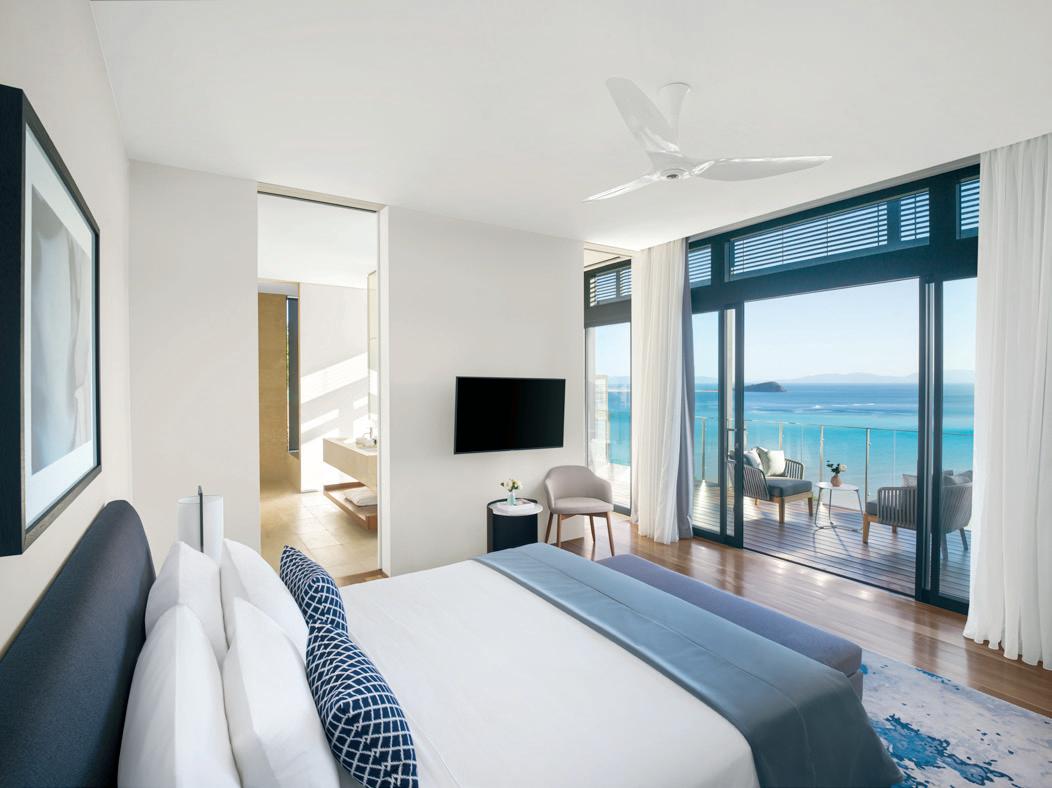



By Stephen West, Business Development Manager, Interline Travel
Overtourism has become a significant global concern, particularly due to the impact of cruise ships.
Increasingly, communities and local authorities are pushing back against the influx of visitors these vessels bring. As massive floating cities, cruise ships can deliver thousands of passengers to a single port in one day, straining local infrastructure and resources.
Visuals of colossal ships overshadowing Venice's historic architecture or throngs of cruise passengers crowding St Mark's Square highlight the challenges many destinations face. While the cruise industry
claims its passengers contribute approximately $150 in daily spending, it's essential to recognise that a large portion of tourism revenue often bypasses local economies. In Venice, for instance, three-quarters of visitors spend very little, and many tourists in Dubrovnik do not pay for accommodation.
In response, some cities are exploring measures like entrance fees or increased port taxes for day-trippers. Current port taxes range from $6 to $23 per passenger, but this alone may not address the broader issue of mass tourism. Budget airlines also play a significant role in overcrowding, benefiting from government subsidies that keep ticket prices low, thus attracting even larger numbers of visitors.
Cities like Venice are already implementing a daily tourist
tax of around $10 and limiting cruise ship access to its canals. Similarly, Amsterdam has restricted cruise ship docking to reduce environmental impacts, pushing larger vessels to less central locations. Santorini and Mykonos have limited the number of cruise ships docking daily, aiming to ease pressure on local infrastructure.
Barcelona, a key Mediterranean cruise port, is also taking steps to regulate the number of ships that can dock, especially during peak seasons. Dubrovnik has capped cruise arrivals to preserve its UNESCO World Heritage status and enhance visitor experiences.
The Kimberley region in Australia is also experiencing challenges with clustering smaller ships, yet there’s concern about how to support local tourism businesses if visitor numbers are restricted.
Finding a balance between tourism and sustainability is crucial. For example, would you support a cruise terminal on the Gold Coast that allows 3000 guests ashore? Regions like the Sunshine Coast and Cairns benefit greatly from cruise visits, showing that with the right management, tourism can be mutually beneficial.
The complexities of overtourism driven by cruise ships involve numerous stakeholders and demand innovative solutions. As awareness of responsible travel grows, there is potential for the cruise industry to adapt into a more sustainable model that prioritises community and environmental health.
While I wouldn’t encourage immediate cruise travel to these affected areas, consider opting for cruises that minimise environmental impact. Thoughtful tourism can help mitigate overtourism and foster better experiences for both visitors and local communities.
Consider, if you are travelling one of our industry-discounted cruises, leaving a smaller footprint than you may have previously, travelling on a ship with 200 to 800 guests, and embracing local tourism and its contribution to the local area.
It was fantastic to see so many industry golf enthusiasts enjoy the Two-Person Ambrose event at Lakelands Golf Club on Friday, December 6. The final event of 2024 was a resounding success!
Thank you to all of the incredible sponsors:
Major sponsors: Watt Utilities, Mahoneys, KONE, Platinum Electrical & Air, McAdam Siemon Business Advisors, Rochele Painting, Nator Constructions, Ras360, SSKB, and Lannock Strata Finance.
Supporting sponsors: ARAMA, The House of Golf, REI Cloud, and Resort News
If you require information about future events contact: Tracey Taylor, Mobile: 0417 360 898





ARAMA celebrated the end of the year with three fabulous social evenings filled with festive fun, canapés, free-flowing drinks, and the amazing company of residential managers, professionals, and service providers. What a wonderful way to wrap up 2024! Gold Coast
A little rain didn’t dampen the spirits at Burleigh Bowls, where attendees had a fantastic time catching up and sharing laughs. A BIG THANKS to the event sponsors: Accom Valuers, Property Bridge, Fidato Services, Dreamtime Resorts and Stayco.











It was wonderful to see so many fabulous members enjoying a relaxed evening at Club Kawana. A BIG THANKS to the event sponsors: Accom Valuers, Complete Property Training, Bugden Allen Group Legal, Griffiths Parry Lawyers, Advisory Services Qld.












The social event at Gallopers Sports Club attracted a lively crowd of managers, industry professionals, and suppliers, all eager to connect, chat, and enjoy a fun evening of lawn bowls. A BIG THANKS to the event sponsors: Accom Valuers, Property Bridge and Fidato Services.











Rob Urquhart from Tourism Brokers, was pleased to be a part of the sale of the new leasehold at Chez Vous Villas in Pokolbin.
The villas had previously been managed by the owners, Leonie and Graham Toole.
Graham and Leonie are delighted to welcome Jenny Nielsen and David Fuller as new leaseholders who come with a wealth of industry knowledge from their successful motel in Warialda.
It looks like their pet alpacas may be making the journey to the Hunter Valley soon to add another dimension to the charming villas at Chez Vous.



































By Mandy Clarke, Editor
Minor Hotels, one of the world’s fastest-growing global hospitality groups, has announced a significant addition to its Australasian portfolio with the signing of management letting rights for the landmark Queen’s Wharf Residences in Brisbane.
Minor Hotels acquired the management and lett ing rights to Queen’s Wharf Residences via a transaction brokered by ResortBrokers’ Director Tim Crooks and Brisbane Broker Jessie Shi on behalf of their
client Far East Consortium and Chow Tai Fook.
The 64-storey Queen’s Wharf Residences is the tallest tower within Brisbane’s transformative Queen’s Wharf precinct, a world-class tourism, leisure, and entertainment hub. Its striking organic elliptical design, inspired by the curves of the Brisbane River, is set to redefine the city’s skyline while solidifying Brisbane’s position as a global destination.
The property off ers an array of 1-, 2-, and 3-bedroom apartments, each designed to maximise the subtropical



climate with balconies and innovative winter gardens featuring lift-and-tilt windows. Guests will also enjoy exclusive access to luxury amenities, including a pool, spa, steam room, theatre, leisure lounge, and gym.
Beyond the tower, the Queen’s Wharf precinct boasts worldclass dining at establishments such as Sokyo and Fat Noodle, spectacular panoramic views from the Sky Deck, and a state-of-the-art event centre. This unique blend of premium accommodation and entertainment sets a new standard for urban tourism in Brisbane.
Lauren Sheldon, Head of Sales and Marketing Australia for property developer Far East Consortium, highlighted the significance of the collaboration.


“Queen’s Wharf Residences has become Queensland’s fastest-selling development, off ering not just a place to stay, but an unprecedented benchmark in urban tourism for Brisbane,” she said. “Minor Hotels’ extensive expertise in property management makes them the ideal partner to deliver the premium experience our guests expect.”
Craig Hooley, Chief Operating Officer for Minor Hotels Australasia, expressed excitement about the partnership.
“This landmark development off ers a product unlike anything Brisbane has seen in terms of scale and proximity to the city’s most exciting precincts,” he said. “With over 550 properties managed globally, including 11 in Brisbane’s CBD, we are well-equipped to elevate Brisbane’s reputation as a premier global destination.”
Minor Hotels operates over 550 properties across 56 countries, spanning eight renowned hotel brands, including Anantara, Oaks, and Tivoli. The group is committed to crafting a more interconnected world through hospitality and aims to expand its portfolio by over 200 properties by 2026.



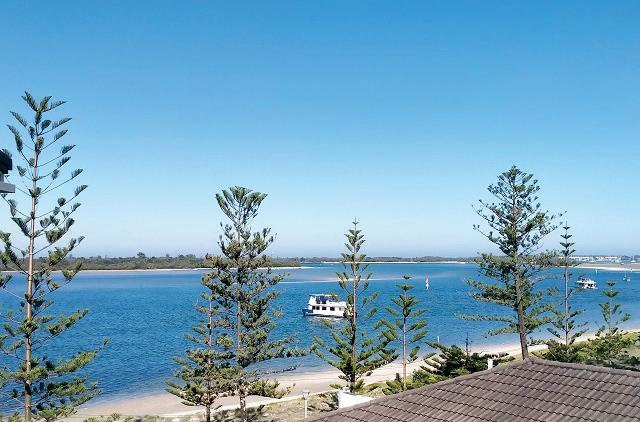







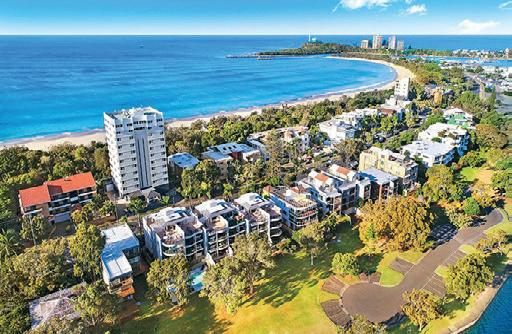
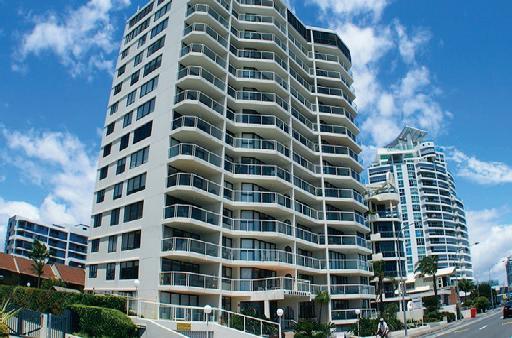
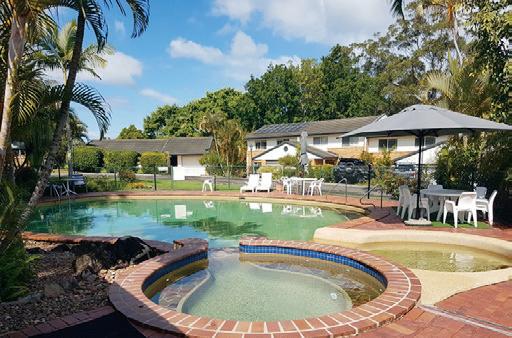






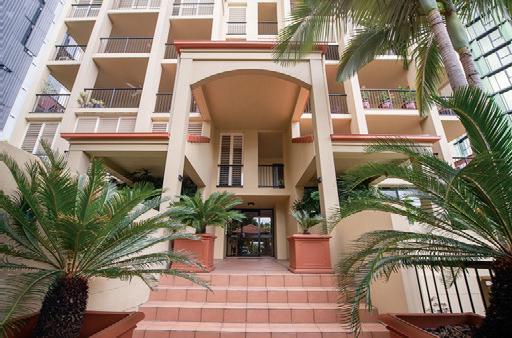
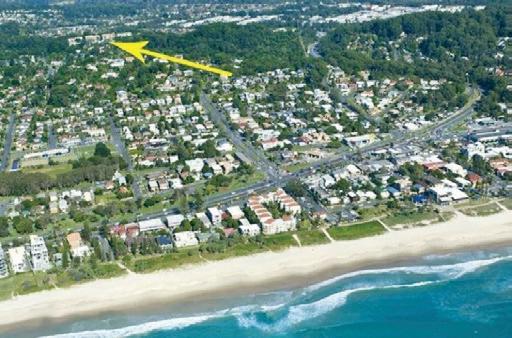



Contact: Chris Cameron, 0408 192 490 chris@offmarkethotels.com.au


Contact: Charlie Eames, 0416 292 659 charlie@premiersales.com.au
Paul Mueller, 0439 255 507

Contact: Clint Amos, 0482 061 261 clint@resortbrokers.com.au

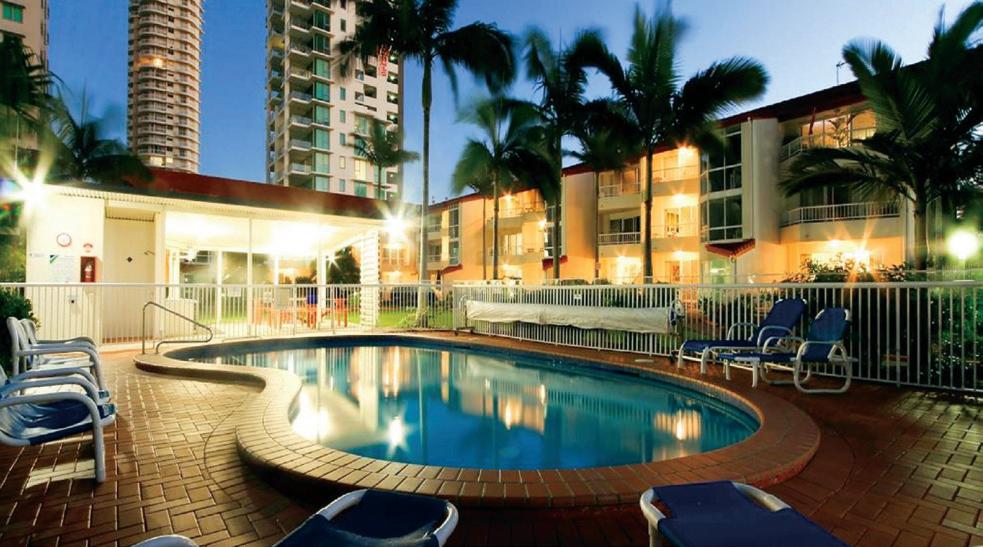

By Grantlee Kieza OAM, Industry Reporter
Before stepping into the role of resident manager at the picturesque Island Beach Resort on the Gold Coast, Lynda Woodgate worked as a teacher in South Auckland. Transitioning to the management and letting rights industry was an education of an entirely different kind!
Since April 2023, Lynda has been managing the property alongside her son and daughter, Chris and Jessica Filer. She emphasises that extensive research and fostering strong relationships within the management and letting rights sector are essential for achieving both success and satisfaction.
She highlights Island Beach's prime location on Margaret














Avenue in Broadbeach as the epitome of coastal living. It serves as an ideal gateway to the Gold Coast’s attractions while offering a serene retreat for guests.
The holiday apartment complex comprises 30 units in a charming resort, situated just one block from the beach. Lynda and her family were drawn to the property for its enviable position in the heart of Broadbeach, where everything is conveniently within walking distance.
“It’s an older-style, three-storey walk-up rather than a modern high-rise, and the location is absolutely stunning,” Lynda said.

“When we first saw it, we thought, ‘What better place to be than Broadbeach?’ Being so close to the beach and living in one of Australia’s most beautiful regions was too good an opportunity to pass up.
“We considered several properties before deciding to purchase the management rights for Island Beach. Initially, it didn’t meet all our criteria — we were hoping for a three-bedroom property.
“However, with no suitable three-bedroom options available to support our business as a team, we chose to compromise.
“In hindsight, that decision worked out perfectly. We love what we do and couldn’t be happier with our choice.”
At Island Beach Resort, Lynda and her family offer one- and two-bedroom apartments, ideal for couples and families seeking an affordable yet memorable Gold Coast holiday experience.
The prime location allows guests to enjoy world-class restaurants, Star Casino, Oasis Mall, the Gold Coast Convention Centre, and Pacific Fair shopping centre — all within walking distance. Despite being in the heart of Broadbeach, the complex offers a peaceful sanctuary for those seeking a restful getaway.
“Managing this complex has truly been a family affair,” Lynda said.
“Jessica, Chris, and I discussed buying the management rights together, and we decided it would be an exciting venture.

“It certainly has been an adventure, and we’ve been far busier than anticipated.
“While management rights are often marketed as ‘lifestyle businesses’ — where you can simply put up a ‘Back Soon’ sign and head to the beach — the reality is far more demanding than we anticipated,” Lynda shared.
“The workload has been surprising, but the experience has also been incredibly rewarding. There’s so much to learn, and we’ve embraced the challenge.”
Having previously worked as

a primary and early childhood teacher, Lynda describes entering the management and letting rights industry as the most challenging chapter of her professional career so far.
“I first came across management rights while searching for properties on the Gold Coast,” she explained.
“As I browsed listings, I kept noticing advertisements for management rights. They highlighted spectacular locations and, what seemed to me at the time, very reasonable prices.
“This was before COVID-19, and I






was intrigued by the concept of buying a property with an assured income. That curiosity led me to start researching the industry.”
She notes that understanding management rights was a steep learning curve, especially for New Zealanders like herself, who are generally less familiar with the concept.
“We had to learn about strata, bodies corporate, and how the whole system operates. There are so many layers of relationships and stakeholders involved,” she said. Despite the complexities, Lynda has been

impressed with the collaborative spirit within her building.
“Our committee is incredibly committed, and their dedication benefits everyone. It’s inspiring to see how much effort goes into maintaining and improving the property, and it’s rewarding to be part of that shared goal.”
The family manages 20 of the 30 units in the resort's letting pool — a workload that keeps them busy.
“Letting pool numbers are always a hot topic when managers get together,” Lynda explained.
















































































































































































Research is critical. Take the time to learn everything you can about the property and the industry
“As investors sell, many new owners choose to occupy their units instead. We started with 21 units in our pool, lost a few along the way, but were fortunate to gain a couple back. Today, we manage 20.”
Lynda added that the building’s three-storey walk-up design tends to appeal less to owner-occupiers, who often prefer the convenience of a lift in high-rise apartments.
For those considering a career in the management rights industry, Lynda shares valuable advice: “Research is
critical. Take the time to learn everything you can about the property and the industry before making a move.
“It’s also essential to engage professionals who understand the complexities of management rights. We worked with Frank Higginson and the team at Hynes Legal, and their expertise was invaluable,” she said.
“Having your lawyers, accountants, and financiers aligned with your goals is crucial. Sett ing up the right business structure and trusts
from the beginning can save you significant costs and stress down the line.”
Lynda also emphasises the importance of building connections within the industry: “I’ve been fortunate to develop strong friendships with other managers.
“Before purchasing our property, I reached out to Kirsty Hislop from the Markham Court complex. She was incredibly generous in sharing her insights and practical advice about the industry.
“Now, I count Kirsty, along with Dorelle from Portobello and Marion Simon from Boulevard North, among my industry friends. Their knowledge and willingness to help have been invaluable.
“Networking with others in the industry, especially those who are newer and can off er fresh perspectives, is incredibly valuable.”
Membership in ARAMA has proven to be a key support system for Lynda and her family.
“ARAMA and its CEO, Trevor Rawnsley, off er excellent resources for people in management rights,” she said.
“And Kelley Rigby is a powerhouse — always ready to share advice.
“Their guidance has been a tremendous help throughout our journey.”
Lynda and her children are thriving in their new venture.
“Management rights off er a dynamic and engaging career, presenting new challenges every day,” she said.
“While the workload can be intense, it’s incredibly rewarding. The opportunity to interact with such a diverse range of people — from guests to owners, body corporates, and tradies — makes every day interesting.
“We love life here and believe management rights is a fantastic industry to be part of.”






















































